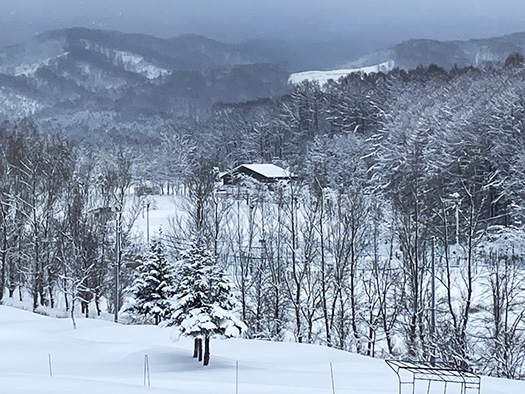
写真は土曜日に行っていた日帰り温泉施設からの冬の北海道のなんでもない景色。雪は木立のすべてに明瞭な「陰影感」を加筆して、墨絵的な美感を際だたせていく。植物という存在が無音ながらまるでオーケストラのように視覚的な「音楽性」を感じさせてくれる。
幼少年期からずっと見続けてきた自然からのこうしたメッセージに、また何度目かの遭遇をして、人生時間の積層のヒダの隅々から記憶再生されてくる時間。特定の事象について、ではなくそういった記憶が総合されて、ひとつひとつの事象を超えた交響楽的に訴求してくる。雪国で生きてきた人間として、その風景との心象での対話を楽しんでいるのでしょうか。
もちろんこういう風景を楽しめるのは、自分がいまいる空間の温熱環境が快適領域である、ということが大きく与っている。断熱気密技術が大前提ということにも気付かされる。北国的な自然環境でも快適な室内環境は保障されてきたということで、こういった人生の余韻的な記憶再生も条件が整ってきたということなのでしょう。
わたしのライフワーク的な部分として、日本的花鳥風月の北海道的自然環境の中でのあらたな発見、みたいなことがあるのですが、たとえば関東以南の風土が生み出してきた「家+庭」文化、床の間和室からその土地の植物群との対話、庭鑑賞的な住宅文化に対して、北海道の住宅では、庭に自然を「切り取ってくる」という気分がそれほど強く起きない。
そういった「自然との対話」は必ずしも「家の中から愛でる」というものではなく、壮大な大自然の季節のいとなみの中にこそ、リアルな美感があると感じているのですね。そういう巨きさから比べたら、チマチマとした箱庭作りには興味が湧いてこない。それくらいなら、野外ジンギスカンの場としてウッドデッキの方が実利的と考えられるのですね。
で、風景の写真のなかでは、三角屋根のシンプルな建築が、オーケストラの中でひときわ印象的に響いてくる。
「お、あそこではどんな暮らし、いとなみがあるのだろう?」という残響のような興味。自然そのものに対してはあきらかに「異物」ではあるけれど、罪多き人為のなかでは、まだしも共感をもって受容できる、みたいな感覚をもつ。
あのような自然環境の中で、室内気候は充足できる環境が保全されて、しずかにまわりの自然と調和している様子、それ自体が「花鳥風月」的でもあるように思える。すくなくともそういう安寧的な心理から自然と語らい得ることが、キモのように感じられるのです。
English version⬇
The winter scenery and the human remains of a triangular roof.
Having experienced the cold winters of Hokkaido since childhood, I have always wondered what “Kacho-fu-getsu” means. I had a feeling like “what is Kacho Fugetsu?” but the comfort of indoor climate may create Shin Kacho Fugetsu. I’ve been wondering what is “Kacho-fu-getsu”?
The photo is a nondescript view of Hokkaido in winter from a day spa I was visiting on Saturday. The snow adds a distinct “shadowy” feeling to all the groves of trees, accentuating their beauty like an ink painting. The presence of the plants, though silent, gives the viewer a sense of visual “musicality” like that of an orchestra.
Encountering these messages from nature, which I have been seeing since my childhood, for the second and third time, I feel my memory replaying from every corner of the layers of my life time. The time when these memories are replayed from the corners of the layers of life time. As someone who has lived in a snow country, I wonder if I am enjoying a mental dialogue with the landscape.
Of course, the reason why we can enjoy this kind of scenery is because the thermal environment of the space we are in is comfortable, which contributes greatly to this kind of psychological impression. We are also reminded that insulation and airtightness technology is a prerequisite. The fact that a comfortable indoor environment is now guaranteed even in the natural environment of northern Japan means that the conditions are now in place for the replay of the lingering memories of life.
One of my lifeworks is to discover new aspects of the Japanese “Kacho-fu-getsu” in Hokkaido’s natural environment. For example, in contrast to the “house + garden” culture that has developed in the Kanto region and southward, in which the Japanese-style room with an alcove is used to interact with the local flora and appreciate the garden, Hokkaido’s houses are designed in such a way that the garden is “cut out” of nature. In Hokkaido, however, there is not such a strong feeling of “cutting out” nature in the garden.
Such “dialogue with nature” is not necessarily something to be “admired from inside the house,” but you feel that a real sense of beauty is to be found in the seasonal life of the grand nature. Compared to that kind of grandeur, I am not interested in making a small, tedious box garden. So a wooden deck is considered more pragmatic as a place for outdoor jingisukan than that.
So, in the picture of the landscape, a simple architecture with a triangular roof resonates in the orchestra.
It is like a reverberation of interest, “Oh, what kind of life and lifestyle do they have over there? This is a kind of reverberating interest. It is obviously “foreign” to nature itself, but in the midst of so much sinful human activity, I have a sense of being able to accept it with empathy.
In such a natural environment, the indoor climate is preserved as an environment that can be fulfilled and is in quiet harmony with the surrounding nature, which itself seems to be like “Kacho Fugetsu” (flowers, birds, winds, and the moon). The key is to be able to talk with nature from such a peaceful mindset.
Posted on 12月 9th, 2024 by 三木 奎吾
Filed under: 住宅マーケティング, 日本社会・文化研究







コメントを投稿
「※誹謗中傷や、悪意のある書き込み、営利目的などのコメントを防ぐために、投稿された全てのコメントは一時的に保留されますのでご了承ください。」
You must be logged in to post a comment.